Plum Village monks and nuns hosted a Day of Mindfulness in Vietnamese at the University of Southern California in Los Angeles on the 5th of April 2014. Almost 60 students of different ages participated. This is the account of the event by the American-Vietnamese newspaper Nguoi Viet.
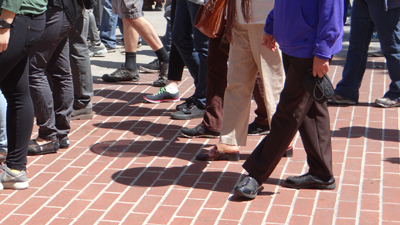
There were about 15 people in brown costumes. Brother Phap Dung and Sister Dang Nghiem, who study with Zen Master Thich Nhat Hanh at Plum Village, France, were the main teachers and guided the class in English.
“The purpose of this class is to live truly, to live deeply, without theories. In the U.S., the young people meet the pressure of a materialistic life, with just promises everywhere,” Brother Phap Dung says. “Today there is no ‘promise’. Today is the present moment. We will show you the ways to touch the energy of living; we will look back and see that we all have that energy. Buddhism has that ability – it is called ‘mindfulness’ and it helps everyone to come back to ourselves. You will learn ‘Walking meditation’, ‘Sitting meditation’ and ‘Relaxation’ to help you come back to yourselves. That is when mindfulness and right thinking will develop,” Phap Dung explained further.
Brother Phap Dung has lived as a monk for 15 years. He came to the U.S. from Vietnam when he was 8. He graduated from USC and used to work as an architect before becoming a monk. He teaches meditation in France, the U.S., India, in the Wake Up movement and this is the first time he teaches for the Vietnamese. This class is part of the Wake Up program, aiming at the young people from 18 to 35 years old. Everyone learns ‘mindfulness’ together to take care of ourselves, nurture happiness and help building a more healthy and loving society.
“Today there’s no promise. Today is the present moment.”
Phap Dung: “Let’s teach the children about happiness, about loving kindness. Teaching the children Vietnamese is not
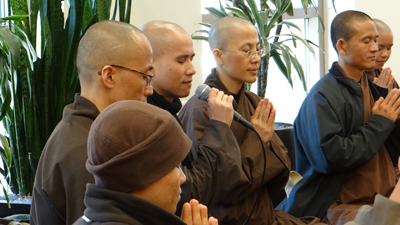
as important because if they have the chance to learn loving kindness from parents and grandparents – they will come back to themselves and find about Vietnamese and their cultural roots themselves.”
He advised not to care too much about outside appearance, because if you do something for your parents – it’s only from the outside. What is important comes from within you, from the breath, from knowing what you are doing. Young people nowadays lead busy lives and family life becomes caught in an impasse. When attending this class, the students don’t learn about religion, but learn from the experiences of the monastics who have got out of the impasse. He told a story of a family where the elder sister attended Days of Mindfulness. The younger children saw the transformation of the elder sister, bringing loving kindness to the whole family. The two younger ones then drove from San Jose to attend the class here.
Sister Dang Nghiem graduated to be a doctor from UC San Francisco, then become a nun afterwards. “There are many things we need but don’t dare to do. It is like being thirsty, standing in front of the river, seeing the water but not daring to drink. We do not know how to have happiness and how to open up ourselves to happiness,” she says.
“There are two important things you need to learn. The first one is happiness. Happiness is not far away. It is right around us. Take a look at the morning sunshine, knowing that you still have parents, 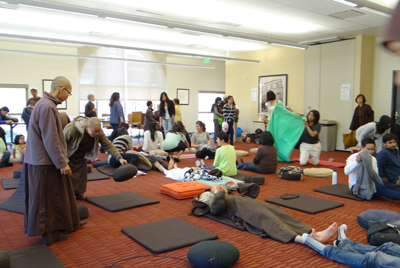
brothers and sisters; to know your heart is still pumping is happiness. The second thing is to know what you have, not what you do not have,” she explained.
She spoke about children who spend too much time fiddling with electronic gadgets, the internet or playing computer games: “Children are online, playing games with friends, but they still feel empty inside. Let’s teach them to play less indoor. Let’s play outside. The important thing is teaching them to know what they are doing like breathing and walking,” she said.
“You have to know what you have, not what you don’t have.”
After the talk, the students were guided to the yard to sing songs. After that a nun guided everyone to practice walking meditation: “Walk slowly, quietly. Walk and breathe in, breathe out and follow the breathe, knowing each footstep.” Everyone stopped on the top of a hill, looking at the trees, grass, flowers and leaves. Some people closed their eyes, hands in front of their chests, thinking deeply.
After that everyone came back to the class for lunch, eating together in silence. Before eating, the monks told the students how to eat mindfully, eating slowly, looking at the food, enjoying the food. Brother Phap Dung bowed gently to the bell before inviting it three times. The sound trills for a while. Everyone waits until the class is quiet again, everyone starts to eat.
After lunch came relaxation. Everyone took two cushions, one for the head and one for the feet. Everyone lay on the floor, some took a hat to cover the eyes, some put a jacket over their head. A nun gently taught how to be aware of yourself. Once in a while there was a bell sound. After not much time everyone seemed to fall asleep. There was some snoring as well. The day was ended by a Q&A session.
Some comments by the participants: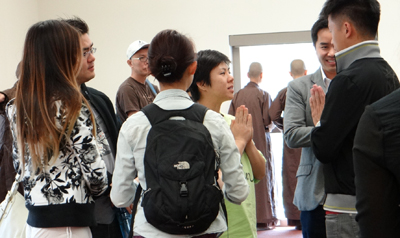
Hieu Nguyen, 13 years old, attended the class many times in the last eight years: “I practice one hour every two days. I feel relaxed, without any worries.”
Ms Thanh Loan: “Meditation requires mindfulness of footsteps and breaths. I feel like now I truly have an honest smile. I am happy after being transformed. You have to be happy to bring happiness to others. I am a Christian, but I follow the class because this is not religion. I attend the class because it really helps my life to be happy.”
Mr. Thong Nguyen, 48 years old, attended the class together with his wife and 16 year old son: “My teenage son often argues with my wife at home. I want him to be more calm, so the whole family attended the class. Six months ago, we attended the course at Tu Vien Loc Uyen, San Diego. It was Very good.”
Mr. Nguyen Loi, 65 years old, attended with his wife: “Now I know that 10 years ago, I was walking in the darkness. I didn’t know how to raise my kids. I suffered and my kids suffered, too. I cared too much about materialistic life. Now my life is more simple, the family is happier.”
Translator: Sam Hang Tran

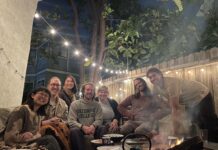








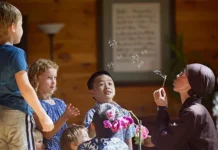






This is very good! Everyone should practice mindfullness!